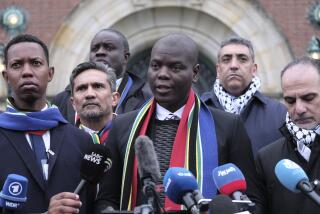Claim of genocide denied in suit
- Share via
Nearly 700 Ivory Coast farmworkers alleging that they became sterile from exposure to a U.S.-made pesticide can’t claim to be victims of genocide because the producers didn’t intend harm, a federal appeals court ruled Wednesday.
The pesticide, known as DBCP for dibromochloropropane, has been banned in the United States since 1979.
The Africans’ suit against Amvac Chemical Corp. of Newport Beach, Dole Food Co. of Westlake Village, Dow Chemical Co. and Shell Oil Co. alleged that the manufacturers of DBCP and the fruit company that used it on overseas crops were guilty of genocide and crimes against humanity. The suit was filed under the federal Alien Torts Statute.
A three-judge panel of the U.S. 9th Circuit Court of Appeals rejected the charges, saying that a nation or party must show “specific intent” to destroy a population to consti- tute genocide.
“No treaty of the United States, no controlling act of the president or Congress, and no judicial decision indicates that genocide is a knowledge-based norm,” the panel wrote. “Nor is there a sufficient consensus that it is a violation of international law to be aware that genocide will occur in the ordinary course of events.”
An attorney for Dow, Edwin Woodsome of the Orrick law firm’s office in Los Angeles, said the 9th Circuit panel ruled correctly in noting that the federal courts had to exercise “vigilant door-keeping” in deciding which cases rise to the level of international law violations.
The Africans’ attorney, Raphael Metzger of Long Beach, disparaged the ruling, blaming it on a conservative group of judges he said weren’t representative of the broader court’s judicial thinking. He said he would pursue a rehearing by the full 9th Circuit.
“The manufacturers continued making money on it by shipping it to Third World countries where farmworkers were given it to use” unaware of its hazards, Metzger said of the banned pesticide.
Numerous suits have been wending through state and federal courts seeking damages from the firms for DBCP’s use on African, Central American and South Pacific plantations. Amvac settled out of court with 13 Nicaraguan plaintiffs last year for $300,000.
--
More to Read
Sign up for Essential California
The most important California stories and recommendations in your inbox every morning.
You may occasionally receive promotional content from the Los Angeles Times.











